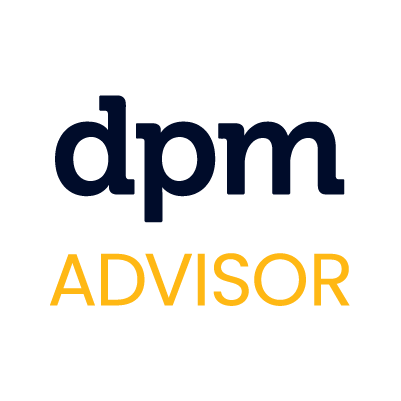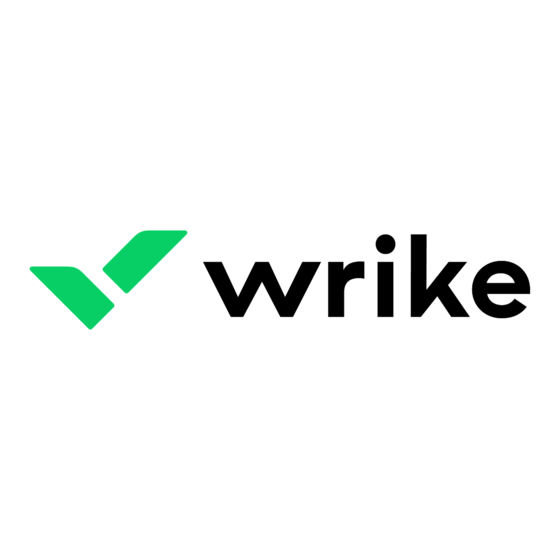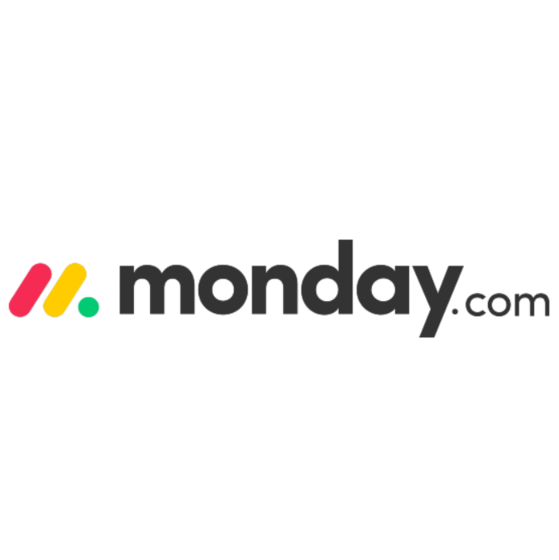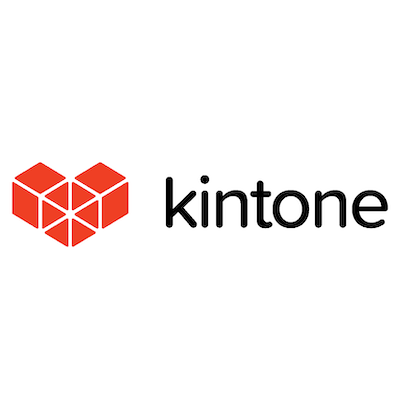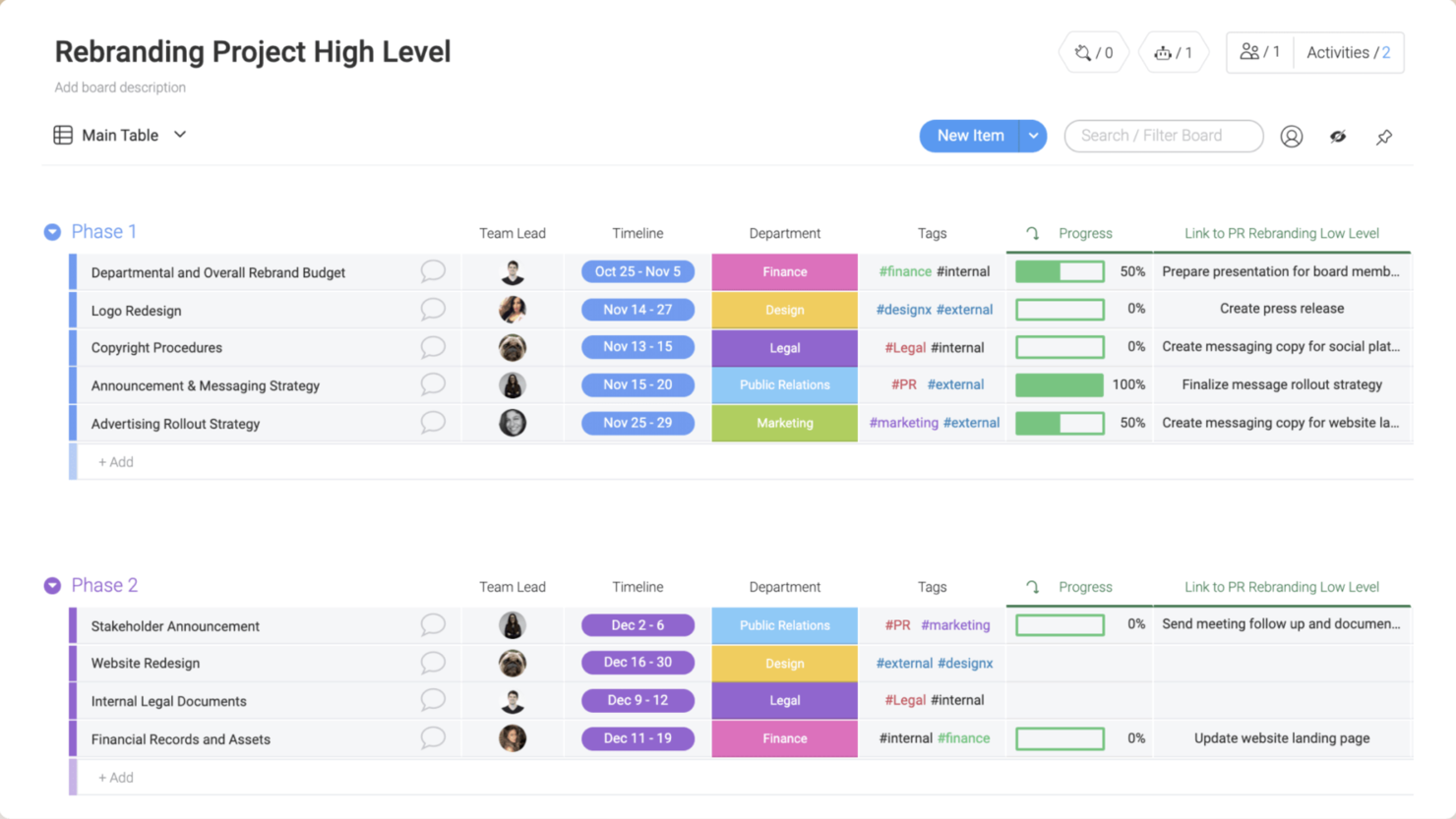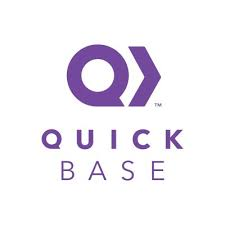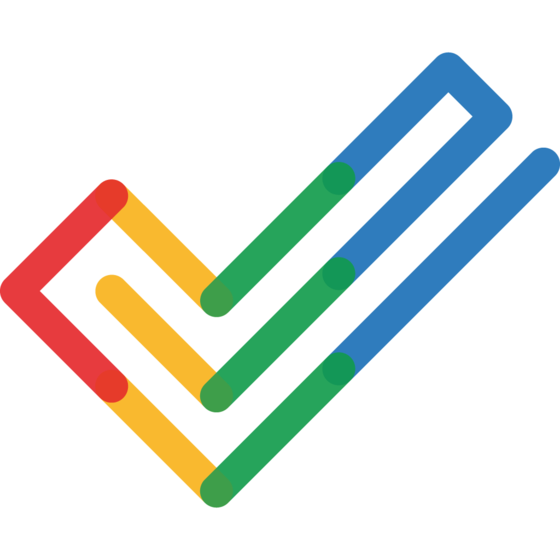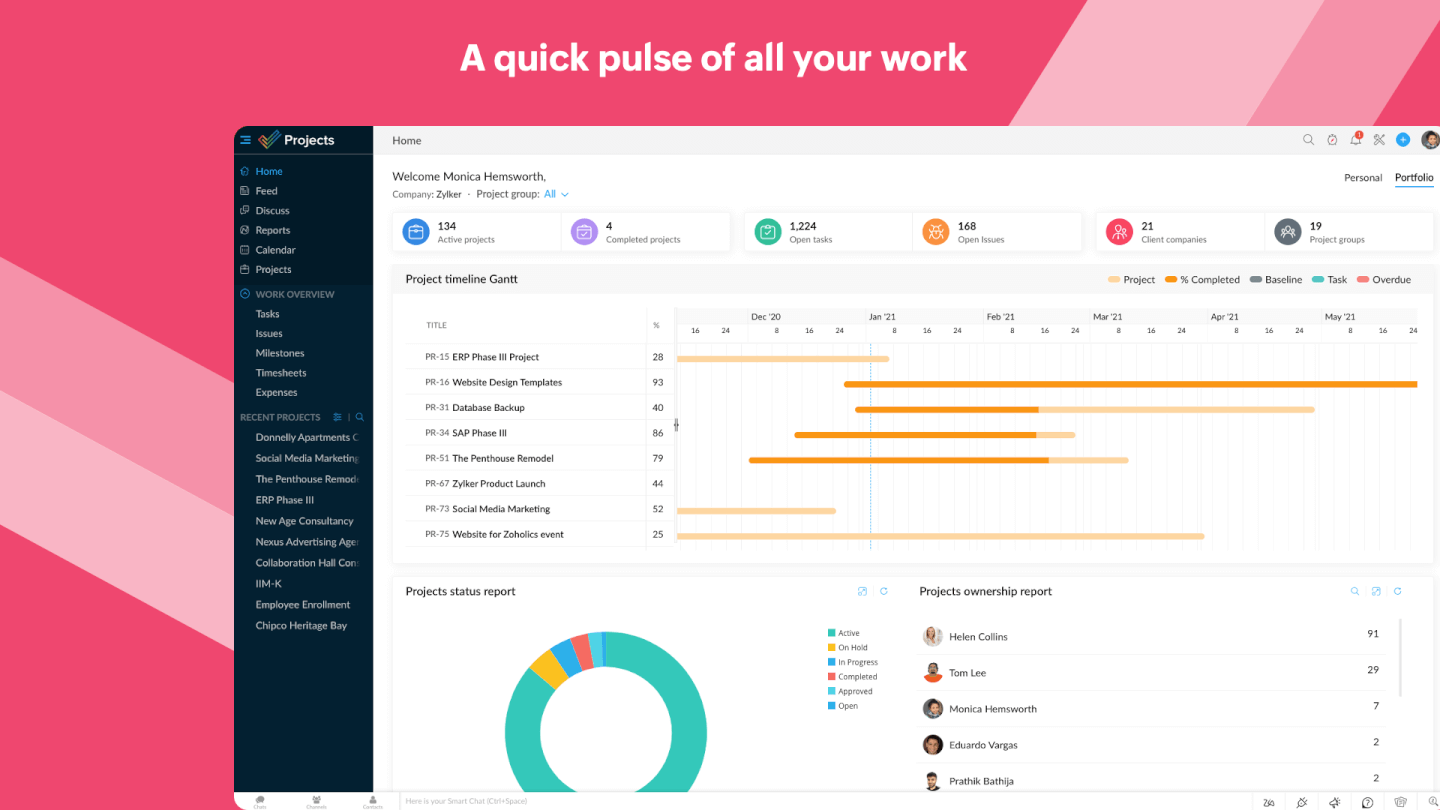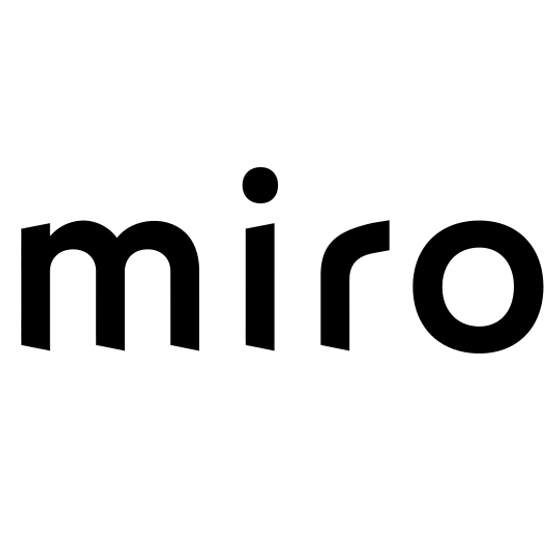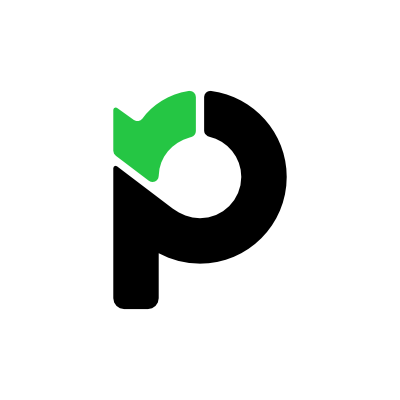10 Best Project Management Software For Small Business Shortlist
Here's my pick of the 10 best software from the 20 tools reviewed.
Get free help from our project management software advisors to find your match.
There are seemingly countless project management software solutions for small business available, so figuring out which is best for you is tough. You want to plan, manage, and control your projects better, but need to figure out which tool is the best fit. I've got you! In this post I make things simple, leveraging my experience managing projects and small teams, and using dozens of different PM tools to bring you this shortlist of the best project management software for small business.
Why Trust Our Project Management Software Reviews
We’ve been testing and reviewing project management software since 2012. As project manager ourselves, we know how critical and difficult it is to make the right decision when selecting software.
We invest in deep research to help our audience make better software purchasing decisions. We’ve tested more than 2,000 tools for different project management use cases and written over 1,000 comprehensive software reviews. Learn how we stay transparent & our review methodology.
The Best Project Management Software For Small Business Comparison Chart
Here is a convenient table where you can see all the tools side by side. Compare them, and, if you want to expand your research, we have even more tools below!
| Tools | Price | |
|---|---|---|
| Kintone | From $24/user/month | Website |
| monday.com | From $8/user/month (billed annually, min 3 seats) | Website |
| QuickBase | From $35/user/month with a 20 user minimum | Website |
| Plaky | From $3.99/user/month (billed annually) | Website |
| Zoho Projects | From $5/user/month (billed annually) | Website |
| Hub Planner | From $7/user/month (billed annually) | Website |
| Miro | From $10/user/month | Website |
| FigJam by Figma | From $3/user/month | Website |
| Paymo | From $5.95/user/month | Website |
| Forecast | From $29/user/month (min 10 seats, billed annually) | Website |
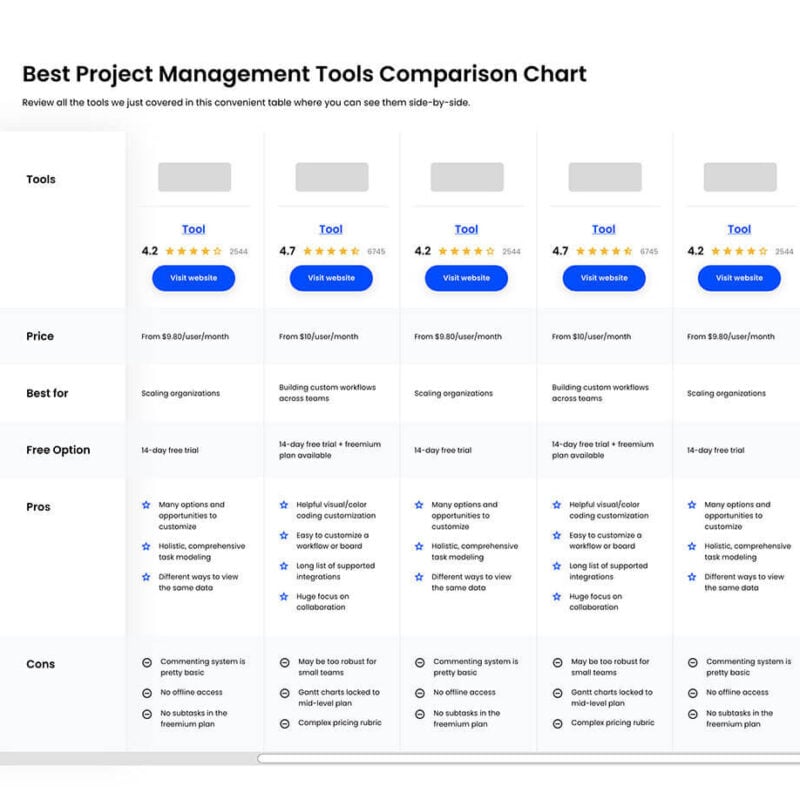
Compare Software Specs Side by Side
Use our comparison chart to review and evaluate software specs side-by-side.
Compare SoftwareHow To Choose Project Management Software For Small Business
With so many different project management solutions available for small businesses, it can be challenging to make decisions on what project management software is going to be the best fit for your small business needs.
As you're shortlisting, trialing, and selecting project management software for small business, consider the following:
- What problem are you trying to solve - Start by identifying the project management feature gap you're trying to fill to clarify the features and functionality the project management software needs to provide. As a small business, it's also a good idea to be aware of the problems you're not trying to solve—you don't want to end up paying for features and functionality that you don't need.
- Who will need to use it - To evaluate cost and requirements, consider who'll be using the software and how many licenses you'll need. You'll need to evaluate if it'll just be the project management professionals, or the whole organization that will require access. When that's clear, it's worth considering if you're prioritizing ease of use for all, or speed for your project management software power users.
- What other tools it needs to work with - Clarify what tools you're replacing, what tools are staying, and the tools you'll need to integrate with, such as accounting, CRM or HR software. You'll need to decide if the tools will need to integrate together, or alternatively, if you can replace multiple tools with one consolidated project management tool.
- What outcomes are important - Consider the result that the software needs to deliver to be considered a success. Consider what capability you want to gain, or what you want to improve, and how you will be measuring success. For example, an outcome could be the ability to get greater visibility into performance. You could compare project management features until you’re blue in the face, but if you aren’t thinking about the outcomes you want to drive, you could be wasting a lot of valuable time.
- How it would work within your organization - Consider the software selection alongside your workflows and delivery methodology. Evaluate what's working well, and the areas that are causing issues that need to be addressed. Remember every business is different — don’t assume that because a tool is popular that it'll work in your organization. Look for software that provides straightforward features and good value for your small business.
Best Project Management Software For Small Business Reviews
Here’s a brief description of each of the best small business management software that are featured on this top 10 list. Feel free to check out how I picked the software on this list at any moment.
Kintone is a customizable project management software for small businesses that is used by teams from McCormick Distillery (Missouri), A-B Emblem (North Carolina), Michael Callahan & Associates (Virginia), and over 23,000 organizations worldwide.
Why I picked Kintone: Their unique approach to project and task management lets you build a wide variety of customizable “apps” either from scratch, using templates or from your existing spreadsheets, for data management, business processes, and workflows. Kintone apps can be customized for project management, sales CRM, customer databases, expense reports, shared to-do lists, equipment management, product feedback, and much more.
Kintone lets you build no-code, project management apps for your small business by dragging and dropping elements that you want to see onto the page: rich text fields, date fields, drop-down menus, number fields with built-in calculations, spaces for attachments, user or group selection menus, related data from other apps, tables, and more.
Once you’ve built the app you want, you can use it to more easily manage whatever data and tasks you and your team need to track. And with custom notifications and reminders as well as detailed permissions settings, your project management solution can look and work however you want it to.
With Kintone’s customization features, small businesses are able to manage all of their workflows for every department within one central platform instead of across dozens of tools (CRMs, expense reports, project trackers, and spreadsheets, to name a few). Save time and effort for your team with clear assignments, filtered lists to help prioritize tasks, and automated reminders and handoffs to manage multi-step workflows.
Kintone’s built-in communication features also allow teams to discuss projects directly in the app and in topic or project-based threads. Dedicated “spaces” organize everything your team needs for your project, including task-tracking apps and searchable conversation threads.
There are so many ways to customize Kintone it can be hard to know where to start. Read the starter blog “What Can You Build with Kintone?” or watch Creating an App from Scratch for a quick look at how the drag-and-drop builder works.
Kintone Standout Features & Integrations
Features include a pre-built application library, enhanced process management, private messaging, real-time custom graphs and charts, and granular permission controls.
Integrations include tools like Slack, Gmail, Google Calendar, Outlook, Tableau, Dropbox, Salesforce, HubSpot, Eventbrite, WordPress, QuickBooks, MailChimp, and many more through a paid plan with Zapier or via API integrations.
Kintone has discounted prices for nonprofits and educators, and it offers a free custom app build as part of the free trial process.
monday.com is an easy-to-use project management tool that saves small businesses money in two ways: offering free/affordable entry-level plans and being super user-friendly to cut back on money lost on training and onboarding. They are used by teams at Uber, Adobe, Hulu, and Unilever, so your SMB can feel like its playing in the software big leagues.
Why I picked monday.com: monday is flexible and scalable with 5 pricing plans available so that it can grow with you. With their freemium plan, you'll already have access to unlimited project boards, hundreds of project/task templates, 20+ column types, and their iOS and Android apps. Pay particular attention to the free project template library—here, you'll find pre-made outlines for editorial calendars, marketing campaign planning, CRM charts, event planning, HR forms, and more. The usefulness of this section for small businesses can not be overstated.
monday.com Standout Features & Integrations
Features include automations, customizable dashboards, forms for client brief intakes, support for agile methodologies, and unlimited free viewers.
Integrations include project management apps like Slack, Google Drive, Gmail, Google Calendar, Jira, GitHub, Trello, Dropbox, Typeform and many more, accessible through a paid plan with Zapier. They also have an apps marketplace with free and paid add-ons to boost your functionality. Again, I cannot stress the level of flexibility and scalability with this form.
QuickBase is a cloud-based application development platform that enables users to build custom business applications tailored to their specific processes and data management needs using a no-code visual builder. QuickBase is suitable for a range of industries and is used by businesses looking to manage their operations more effectively without extensive programming expertise.
Why I Picked QuickBase: QuickBase serves as project management software for small businesses by providing a platform where users can create custom applications to manage their projects and processes. The tool allows for the centralization of project information, enabling team members to access, share, and update data in real time.
With features such as customizable dashboards, automated workflows, and real-time reporting, QuickBase also helps small businesses keep track of project progress, manage tasks, and make data-driven decisions. The no-code aspect of the platform is particularly beneficial for small businesses that may not have extensive IT resources, as it allows them to tailor applications to their specific needs without requiring programming expertise.
QuickBase Standout Features & Integrations
Features include a customizable database, form builder, reporting tools and dashboards, collaboration tools, mobile access, user permissions and access control, data import and export functionalities, audit trails and version control, and security and data governance capabilities.
Integrations include Salesforce, Slack, Microsoft Teams, Tableau, Jira, Procore, and Zapier.
Plaky is a free task and project management software designed to support unlimited projects and users. Its user-friendly interface allows for clear visualization of deadlines and task statuses, facilitating efficient organization and tracking of various projects. The platform is ideal for businesses looking for a simple visual task management platform.
Why I picked Plaky: When it comes to managing tasks, Plaky is an accessible tool for small businesses because of its free plan, which includes unlimited users and projects. The platform provides features for time tracking, team communication, project and process organization, progress tracking, and task templates. It supports team collaboration by offering a space for sharing updates and files, and it includes a mobile app for managing tasks and updates from anywhere.
Plaky Standout Features & Integrations
Features include Gantt charts, task assignments, to-dos, project statuses, color coding, custom fields, comments and notifications, and ready-made templates for a wide range of use cases.
Integrations include Pumble for team communication and Clockify for time tracking.
Zoho Projects is an online project management tool that lets teams plan, track, and collaborate on project work. The tool is scalable for small businesses and mid-size businesses.
Why I picked Zoho Projects: It allows users to set up project plans, as well as create and assign ad-hoc tasks across the team. The tool also includes features like flexible work hours, baselines, and critical paths in Gantt charts, team based work allocation, and task reminders. Time tracking and resource utilization features help managers ensure that employees are not over or under worked.
Users can automate task transitions and workflows, track activities and progress by using the advanced reports, and manage budgets with expense management features. Collaboration features include team-wide and individual discussion management, a meeting tab to facilitate virtual meetings, a social feed to interact with and keep track of all your project activities, a forum to discuss ideas and solutions, and a central document management module to manage all information. Mobile applications are also available.
Zoho Projects Standout Features & Integrations
Features include critical path, resource utilization, task workflow automations, virtual meetings, project forums, multiple task views, issue tracking, charts, and reporting.
Integrations include Zoho apps like Zoho CRM, Zoho Cliq, Zoho Meeting, as well as with other third party apps like Microsoft Office 365, Microsoft Teams, Google Drive, Zapier, Zendesk, and ServiceNow.
Hub Planner is a simple online project management tool designed to help small businesses manage their resources, schedules, and projects more efficiently. With advanced features such as resource management, scheduling, time tracking, collaboration, and customizability, Hub Planner is ideal for teams looking to improve their project management capabilities.
Why I Picked Hub Planner: Hub Planner stands out for its comprehensive resource management and scheduling features, user-friendly interface, and excellent customer support. I appreciated the platform's ability to track and allocate resources effectively, manage complex projects with ease, and visualize project progress through its Gantt chart feature. The platform's flexibility and customizability, as well as its integration with other software tools, are also worth checking out. Furthermore, users appreciate the responsiveness and helpfulness of Hub Planner's customer support team. Overall, Hub Planner's powerful features, intuitive interface, and exceptional support have made it a popular choice among businesses looking to improve their project management capabilities.
Hub Planner Standout Features & Integrations
Features include resource management, PTO planning, timesheets, reporting, skills matching, task management, templates, drag and drop scheduler, project budgets, approval flow, smart scheduler, and third-party integrations/add-ons.
Integrations include DIY options via their Hub Planner API and webhook. Or, open an account with Zapier for more options (may incur an additional cost).
Miro is a collaborative online whiteboard platform and project management software widely used by small businesses. It provides a range of templates like mind maps, Kanban boards, and Gantt charts and allows the import and further development of existing charts from tools like Visio.
Why I picked Miro: Miro's integration with project management tools such as Jira and Asana allows for real-time updates, ensuring all team members stay in the loop. The platform emphasizes interactive, visual work boards and offers built-in video conferencing and features like commenting, voting, and stickies, for better collaboration.
Small business teams can articulate ideas through diverse formats, incorporating numerical data, images, and videos. Miro also visually tracks project milestones and interdependencies through the dependencies app. This wide range of visual components and collaborative features helps organize project tasks and facilitate communication for all team members, wherever they are in the world.
Miro Standout Features & Integrations
Features include built-in video conferencing, dependencies app, planner, estimations, Miro templates, voting, timer, reactions, infinite canvas, stickies capture, Miro assist, and much more.
Integrations include Confluence, monday.com, Zoom, Figma, Asana, Microsoft Teams, Jira, Slack, Google Drive, Box, Airtable, Notion, Azure, Webex, and more. Some integrations are limited to paid plans only.
Pros and cons
Pros:
- Built-in communication features for streamlined collaboration
- Intuitive and easy setup
- Free forever plan available
Cons:
- Free version does not allow high-quality export to pdf
- Zooming can be jumpy on larger projects
- Visitor/guest accounts locked to paid plans only
Best for a highly versatile and collaborative platform
FigJam is an online whiteboard tool created by Figma that easily connects with Figma's design tool to bring together your team's brainstorming, project planning, and execution.
Why I picked FigJam: This software provides a really flexible solution for project planning and management. Your team can facilitate different types of teamwork with the whiteboards, including brainstorming, workflow design, and strategic planning. I added it to my list because this versatility can be super useful for startups and small businesses where teams are planning, executing, and ideating in quick succession.
The whiteboards can be created from a blank canvas, or you can select from any of the pre-built templates included in the platform. Templates for brainstorm frameworks, timelines, roadmaps, and more are available. Your team can create workflows, come up with ideas, and more. Automations are also included that can auto-sort your notes into action items, group similar post-its, and other time-saving hacks.
FigJam Standout Features & Integrations
Features include pre-built project management templates, audio and live chat, stamp and emoji reacts, external collaborator access, calendar and timeline widgets, bitmoji avatars, music player, and mobile app.
Integrations include Figma, Microsoft Teams, Asana, Jira, Mixpanel, and Github.
Paymo is one of the best project management software for small businesses. Paymo helps freelancers and small teams manage their projects and tasks, track work time, and bill clients from the same platform. You can use it across devices in your web browser or by downloading their app (Android and iOS).
Why I picked Paymo: You can manage different workspaces and workflows, communicate in real-time, set recurring tasks, assign multiple users, and set deadlines and priorities. View all your tasks across all projects grouped by priority, progress, or due date. Even better, use the meta Kanban board to overview your team’s tasks grouped by workflow and user.
You can set a task hours budget and get notifications for due dates or exceeded budgets. Then, track time spent on tasks and projects and turn those timesheets into reports and invoices. Add time entries via form or add time in bulk if you need to log time for several tasks and projects.
Paymo Standout Features & Integrations
Features include invoicing from timesheets, online payments, file proofing, automatic time tracking, team scheduling, Gantt charts, and reporting.
Integrations include popular apps such as Slack, Google Suite, QuickBooks Online, Xero, JotForm, and Shift, to name a few. Other integrations are available through Zapier or by syncing with their fully-documented API.
Free for freelancers and teams of up to 10 users.
Forecast is a project management software for small business that unites your projects, resources, and financials in one AI-powered platform.
Why I picked Forecast: You can leverage Forecast’s workflow automation capabilities to create smart schedules, estimate timeframes and budgets, and populate timesheets instantly.
Additionally, you can control the workflow by building out detailed task lists and flagging clear priorities. Task cards allow every team member to easily comment, share files, and register time spent. Everything related to the specific task appears in one place, including dependencies and subtasks. You can put together projects for any type of work: fixed price, time and material, or retainer.
Forecast’s AI learns from previous work and suggests the number of hours you normally register on similar tasks to help you log time faster. You can monitor time registrations from a team perspective and notify each member if they forget to enter something in. Time tracking utilization on a company-wide level is calculated for you for easy alerts, estimates, and reporting.
Forecast Standout Features & Integrations
Features include resource management, project accounting, business intelligence, retainer budget-type projects, auto-schedule, and AI-based recommendations.
Integrations include Slack, Microsoft Teams, iCloud Calendar, Google Drive, Google Calendar, Outlook, Harvest, Trello, Asana, GitLab, Github, and dozens more using a paid plan through Zapier. Higher-tier subscriptions include native integrations with Timelog, Xero, QuickBooks Online, JIRA, Azure DevOps, Salesforce, Okta, OneLogin, and Azure Active Directory.
Get the PM Software Buyer's Guide
Other Project Management Software For Small Business
Here are more tools that did not make it to the top 10 but are worth your consideration.
- Trello
Best free Kanban board tools
- Teamwork.com
Best PM app for client work
- Asana
Best for goal setting & tracking
- Basecamp
Best for project management beginners
- Hubstaff Tasks
Best easy Agile project management
- Projectworks
Best for consultants, engineering firms, and architects
- Ravetree
Best project management in an all-in-one platform
- CROOW
Best for workflow customization & automation
- TeamGantt
Best easy, low-cost Gantt charts
- Height
Best for its number of features available for free
Related Project Management Software
If you still haven't found what you're looking for here, check out these other related tools that we've tested and evaluated:
- Project Management Software
- Resource Management Software
- Task Management Software
- Collaboration Tools
- Project Tracking Software
- Project Scheduling Software
Selection Criteria For Project Management Software for Small Business
Selecting the right project management software for small businesses involves careful consideration of various factors that directly impact functionality, user experience, and overall project success. Drawing from my personal experience trialing and researching these tools, I've developed criteria to evaluate them comprehensively. Each criteria represents an aspect of the software that I believe is key to the tool's overall success, and is weighted to reflect its importance to my overall evaluation.
Core Project Management Software Functionality (25% of total weighting score): To be considered for inclusion on my list of the best project management tools for small business, a solution had to support the ability to fulfill common use cases:
- Task and project tracking to ensure timely completion
- Collaboration features for team communication
- Resource allocation to optimize workload distribution
- Budget management to keep financials in check
- Reporting and analytics for informed decision-making
Additional Standout Features (25% of total weighting score): Standout features differentiate a good tool from a great one, offering small businesses innovative ways to solve unique challenges. For small businesses, I look for straightforward solutions that offer:
- Innovative collaboration tools beyond basic chat functions, like integrated video calls or real-time document editing
- Advanced automation features for recurring tasks and notifications
- Customizable dashboards that offer a bird's-eye view of projects
- Integration with external tools, enhancing the tool's utility without complicating its use
- Mobile apps that are fully functional, allowing on-the-go management and access
Usability (10% of total weighting score): Usability is key to ensuring that all team members, regardless of their technical proficiency, can effectively use the tool. In evaluating usability, I focus on:
- Intuitive interface design, such as drag-and-drop scheduling tools
- Clear, easy-to-navigate menus and project views
- Quick access to commonly used features and information
Onboarding (10% of total weighting score): The onboarding process is critical for a smooth transition to a new tool, impacting how quickly a team can realize its value. Here, I look for:
- Availability of comprehensive training materials, like videos or interactive tutorials
- Pre-built templates to quickly start new projects
- Efficient customer onboarding processes, including interactive product tours or dedicated support
Customer Support (10% of total weighting score): Reliable customer support is indispensable, providing users with assistance and guidance when they encounter issues. My evaluation considers:
- The responsiveness and availability of the support team
- The range of support options, from live chat to detailed knowledge bases
- Community forums or networks for peer support
Value For Money (10% of total weighting score): For small businesses, ensuring that the investment in project management software yields a significant return is very important. This criteria assesses:
- Transparent pricing models that align with the features offered
- Flexible plans that cater to small businesses' budgets and scalability needs
- Free trials or demos to evaluate the tool before committing
Customer Reviews (10% of total weighting score): Customer reviews offer invaluable insights into a tool's real-world performance and impact. I examine:
- Overall customer satisfaction and feedback on usability
- Testimonials regarding customer support and problem resolution
- Reviews highlighting the tool's impact on project success and business growth
In focusing on these criteria, I aim to provide small businesses with a clear roadmap to selecting a project management tool that not only meets their immediate needs, but also supports their growth and enhances their operational efficiency. Through this meticulous evaluation process, my goal is to ensure that small businesses invest in a tool that genuinely adds value, fostering a more productive, organized, and collaborative work environment.
Trends in Project Management Software For Small Business In 2024
2024 has brought about fascinating developments in project management software that are shaping the industry, especially for small businesses. As small businesses seek more efficient, flexible, and comprehensive solutions for their project management needs, software trends are also reflecting a move towards enhancing usability, integration, and collaborative features. Here, I have identified several trends that I believe will continue to be important, for small businesses and beyond, as project management evolves.
Trends in Project Management Software
- Integration with AI and Automation Tools: There's a noticeable shift towards incorporating artificial intelligence and automation to streamline project planning and execution. These features automate repetitive tasks, provide predictive analytics for better decision-making, and enhance task management efficiency.
- Rise of Mobile Project Management: The importance of mobile applications has grown, with updates focusing on offering full functionality on mobile platforms. This trend caters to the needs of teams that require access to project management tools on the go.
- Emphasis on Security and Compliance: As project management software becomes more central to business operations, there's a heightened focus on ensuring data security and compliance with regulations such as GDPR. This trend is particularly important for small businesses that may not have extensive in-house IT security resources but still need to protect sensitive project and customer data.
- Built-in Learning Capabilities: Some tools are beginning to incorporate built-in learning and development features, such as access to online courses, integration with training platforms, or resources for skill development related to project management. This trend acknowledges the continuous learning curve in project management and the need for teams to stay updated on best practices and new methodologies.
Novel and Unusual Functionality
- Virtual Reality (VR) for Project Visualization: Some of the most novel functionalities include the use of VR for project planning and visualization. This allows teams to immerse themselves in project designs and plans in a three-dimensional space, offering a unique perspective on project management.
These trends underscore a significant shift towards making project management tools more intuitive, collaborative, and aligned with evolving business landscapes, all while ensuring that they are accessible from anywhere, at any time. By incorporating these features, project management tools are becoming indispensable allies for small businesses aiming to navigate the complexities of modern project execution.
What Is Project Management Software For Small Business?
Project management software for small business are tools that help smaller companies efficiently plan, execute, and monitor projects. These project management solutions offer a range of features tailored to meet the unique needs of small businesses, such as task assignment, timeline tracking, resource allocation, and budget management. They are typically more user-friendly and cost-effective than larger enterprise systems, making them accessible for smaller teams with limited resources.
By providing a centralized platform for all project-related activities, they help small businesses streamline their operations, enhance team collaboration, and keep projects on track, ultimately contributing to improved productivity and business growth.
Features of Project Management Software For Small Business
Navigating the complexities of project management can be a daunting task for small businesses. The right software should help to guide teams through project planning, task management, collaboration, and progress tracking to ensure efficient project execution and successful outcomes. For small businesses aiming to streamline their project management processes, certain features in project management software stand out as essentials. Here are some crucial features to look for when selecting project management software as a small business.
1. User-Friendly Interface: A straightforward and intuitive design is vital. This ensures that all team members can navigate and utilize the software efficiently, regardless of their tech savviness.
2. Task Management: Enables the creation, assignment, and tracking of tasks. This feature is fundamental for keeping projects organized and ensuring everyone knows their responsibilities.
3. Collaboration Tools: Facilitate seamless communication among team members. Features such as in-app messaging, file sharing, and comment sections are crucial for maintaining clear and continuous dialogue.
4. Time Tracking: Allows teams to record the time spent on tasks. This feature is important for budgeting, invoicing, and understanding team productivity.
5. Project Scheduling: Offers calendar views and Gantt charts to visualize timelines. Effective scheduling is key to ensuring projects stay on track and deadlines are met.
6. File Sharing and Management: Centralizes documents in one accessible location. This keeps all project-related files organized and readily available to team members.
7. Budgeting and Expense Tracking: Helps monitor project finances. This feature is essential for keeping the project within budget and tracking financial progress.
8. Customizable Reports: Generates tailored reports on various aspects of the project. This feature provides insights into project health, team performance, and areas for improvement.
9. Mobile Accessibility: Ensures the software is accessible on various devices. This is crucial for team members who need to access project information on the go.
10. Integration Capabilities: Allows the software to seamlessly connect with other tools. This feature ensures a smooth workflow and minimizes the need for multiple platforms.
Moreover, plans suitable for small businesses typically offer scalable features that grow with your team, cost-effective pricing that fits tight budgets, and dedicated support to navigate any challenges that arise. This focus ensures that small businesses can reap the benefits of project management software without being overwhelmed by complexity or cost.
Overall, selecting the right project management software can be a pivotal step for small businesses looking to streamline operations and promote successful project delivery. By prioritizing these features, small businesses can ensure they choose a tool that not only meets their current needs, but also supports their growth and success in the long run.
Benefits of Project Management Software For Small Business
For small businesses trying to optimize project outcomes and enhance team collaboration, selecting the right project management software can be a game-changer. This software can offer a plethora of benefits, from improving organization to ensuring projects are delivered on time and within budget. Here, I describe five primary benefits that stand out for users and organizations, shedding light on why this investment can be pivotal for small business success.
1. Enhanced Collaboration: By centralizing discussions, documents, and tasks, project management software ensures everyone is on the same page, fostering a collaborative environment that transcends geographical and time barriers.
2. Improved Organization: This software allows users to categorize tasks, set deadlines, and track progress in real-time, significantly reducing the risk of overlooking important details and ensuring everything is in its right place.
3. Increased Efficiency: Automation of routine tasks and the provision of a clear roadmap for each project phase mean that teams can work more efficiently, focusing their efforts where it counts the most.
4. Better Resource Management: Understanding the availability and workload of team members enables managers to distribute tasks in a way that optimizes productivity and prevents burnout, ensuring resources are used efficiently.
5. Enhanced Decision Making: With access to real-time data and customizable reports, businesses can make strategic decisions based on accurate information, improving outcomes and avoiding costly mistakes.
Software suited for small businesses should also be designed to grow with the company, avoiding the complexities and high costs associated with more enterprise-level solutions. This focus on scalability, coupled with user-friendly interfaces and budget-friendly pricing models, ensures that small businesses can enjoy the full suite of project management benefits without being bogged down by unnecessary features or prohibitive costs.
Opting for project management software tailored to the unique needs of small businesses can not only elevate the efficiency and effectiveness of project execution, but also position these businesses for sustainable growth and success. The benefits also extend beyond mere project completion; project management tools can enhance team dynamics, fostering a culture of transparency and accountability, and ultimately contributing to a more robust bottom line.
Costs & Pricing For Project Management Software For Small Business
As a small business, it can be tempting to choose the cheapest pricing plan available and call it a day. However, you may actually get the most value out of a slightly more expensive plan that offers more comprehensive features. Consequently, understanding the various plan and pricing options available is crucial in selecting a software that not only fits your small business's budget, but also provides the functionalities required to streamline project planning, task management, collaboration, and progress tracking in a way that enhances your team's productivity and success.
Typically, project management software offers a range of plans to accommodate the diverse needs and sizes of small businesses. Here is a breakdown of the general prices and plans that you can expect to see on your search for the right project management software for you.
Plan Comparison Table for Project Management Software for Small Business
| Plan Type | Average Price | Common Features |
|---|---|---|
| Free | $0 | Basic task management, limited users, essential collaboration tools, access to community support |
| Basic | $10 - $20/user/month | Enhanced task management, expanded user access, project templates, email support |
| Standard | $25 - $35/user/month | Full project planning tools, advanced reporting, integrations with other software, phone support |
| Premium/Pro | $50 - $65/user/month | Comprehensive analytics, priority support, custom integrations, increased security features |
| Enterprise | Custom Pricing | Customizable features, dedicated account manager, enterprise-grade security, unlimited integrations |
When considering a plan, it is important to assess not only the initial cost, but also how the features provided by each plan can support and grow with your business. It’s essential to choose a plan that offers the best value by balancing functionality with affordability, ensuring your project management tool is a beneficial long-term investment for your business.
Small Business Project Management Frequently Asked Questions
Find answers to common questions other people ask about this topic.
What is project management software for small business?
Project management software is software that helps PMs plan, execute and control their projects across the five phases of the project lifecycle. Additionally, it helps the project team and stakeholders work together more effectively. The ultimate goal of the software is to help deliver value more efficiently by facilitating organization, communication, and management.
In a small business, the PM tool you choose will become the command centre from which you control all project-related information in the company. Therefore, choosing a tool is something you must carefully consider.
See a list of some free workflow software for small teams.
What key features should I look for in PM software for small business?
Ideally, you want your project management tool to have a little bit of everything. This is mostly because most small businesses don’t have the budget to pay for several tools.
- File sharing at a task level. Very common in PM software and will help you share more than just text-based project progress.
- Mobile app access. Important to have so you can track projects on the go. Especially if you are constantly out of the office, visiting clients.
- Templates. A way to easily start new projects. This will save you A LOT of time.
- Team collaboration. In most cases an ability to talk to other team members, such as mentions, comments, and an in-app chat.
- Invoicing and billing. This one is key if you work with a lot of freelancers or other external contributors.
- Real-time help desk support. Look for a tool that has good tool support. Key if you don’t have IT support people in your company yet.
- Flexible alerts & notifications. Key feature if you want to stay on top of what your teams are doing across projects.
- Multiple project views. Timeline views, calendar views, Scrum and Kanban boards, Gantt charts, roadmaps…the more, the merrier!
- Task management. Task assignment, custom fields to outline your tasks, deadlines, task dependencies, and other tools to clarify and streamline tasks.
Does a small business need a project manager?
Short answer is yes! In a small business, you can think of the project manager as a very organized person you have within your ranks.
Small businesses normally have big ambitions and, because of that ambition, take on all sorts of initiatives. A project manager can make sure you deliver consistently on the work where you have commitments with a client. In turn, this lets you run wild with all other experiments.
You might also need a CRM if you want to have control over your client information and interactions.
What other project management tools can I use?
If project management software for small business isn’t the right fit for your needs, there are plenty of other project management tools out there that might suit you better. Check out some of our other project management software reviews:
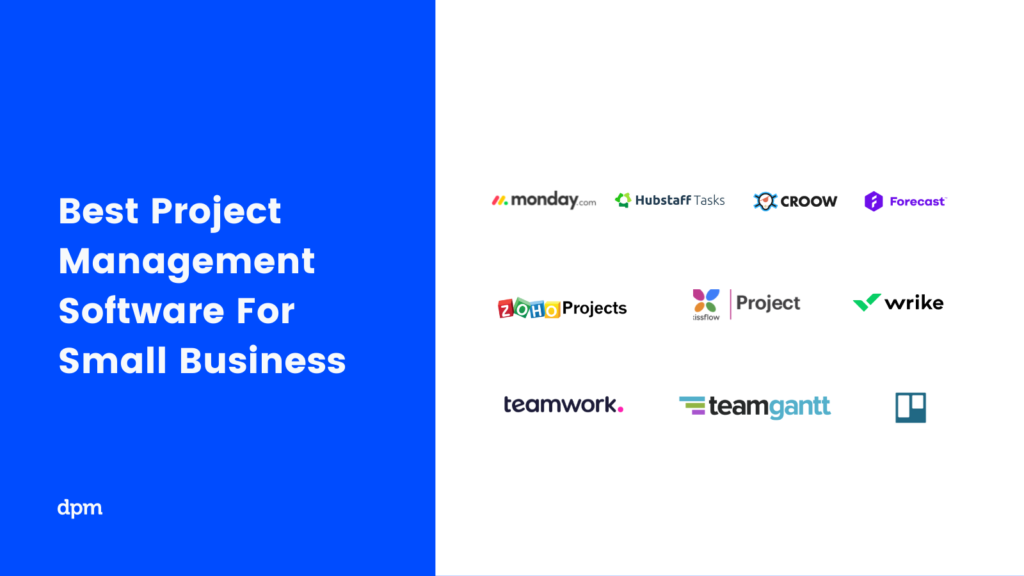
What's Next?
Since you are part of a small business, you need additional knowledge besides a list of tools. Therefore, I recommend you read what is a project charter and how it can help you start projects on the right foot. At this stage, you might also benefit from learning how to write a project proposal and act as a bridge between sales and delivery.

